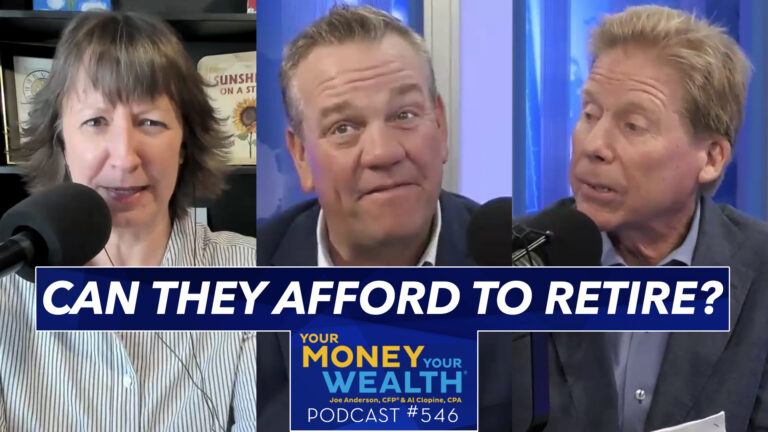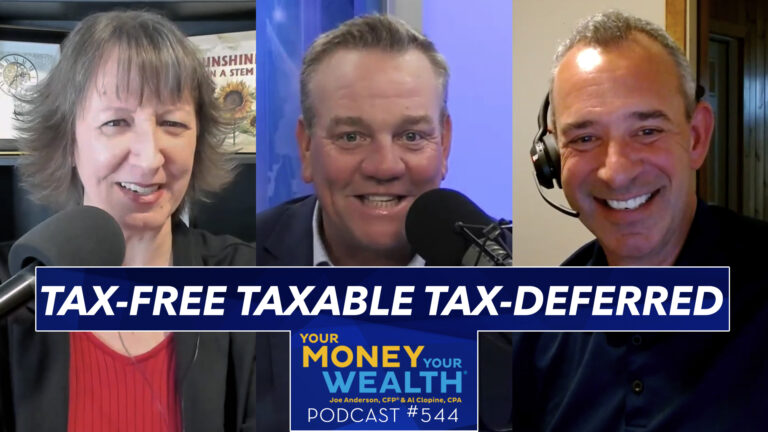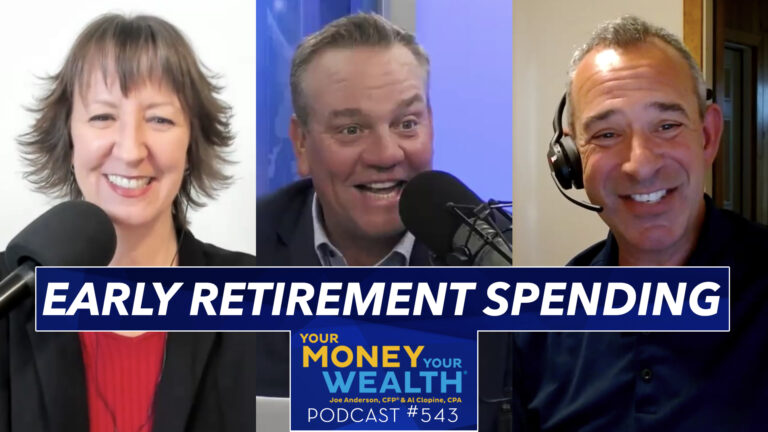Joe Saul-Sehy, host of the top-rated personal finance podcast Stacking Benjamins joins Joe Anderson, CFP® and Big Al Clopine, CPA on Your Money, Your Wealth® podcast episode 80. Saul-Sehy talks about what investors or anyone interested in personal finance can learn from his unorthodox show focused on headlines and impressive guest perspectives. Joe and Big Al wrap up the show answering listeners personal finance questions.
00:00 – Intro
02:29 – Start of Interview with Joe Saul-Sehy
03:01 – Joe Anderson: “What is the genesis behind the podcast and tell us a little bit about it.”
03:41 – Joe Saul-Sehy: “Our goal is headlines – it’s a magazine-style show…we have great discussions about current events, financial planning and making sure people have the type of great advice that’s out there.”
06:02 – Joe Saul-Sehy: “That’s kind of how “Stacking Benjamins” was born – it allowed me to talk about money in a way where we kind of learn through play.”
06:35 – Joe Anderson: “You’re the number one ranked financial podcast. How did that happen?”
06:43 – Joe Saul-Sehy: “Kiplinger just called us number one last week, Art of Manliness put us on 27 podcasts men should listen to…all we’ve ever focused on is putting out the best product we possibly can, and people seem to come.”
08:05 – Joe Saul-Sehy: “There’s all this noise going on – you’ve got big media outlets with talking heads…everyone is talking about what you need to do now, yet you know most of the time the thing you should do is absolutely nothing. Study after study shows that the thing a great advisor brings to the table is convincing you that holding the line is the perfect thing for you to do.”
12:44 – Joe Saul-Sehy: “When I was an advisor, every smart person that was a client of mine could have done my job on their own but they always went to an advisor to look over their shoulder.”
15:12 – Joe Saul-Sehy: “I found that the more blunt I got, and the more I challenged people about their thinking when I disagreed with it, the more they wanted to hire me. That’s probably who you should be searching for when you’re looking for an advisor.”
16:00 – End of Interview with Joe Saul-Sehy
19:25 – “What are some examples of a value-added tax?”
21:26 – “I am 60 years old and plan to retire at 67. I have a 403(b), a HSA, and a couple mutual funds, but I keep hearing I should start a Roth IRA. Why would I want to start a Roth on the home stretch?”
24:30 – “If you’re in a low tax bracket right now, you might even want to look at Roth conversions relative to your retirement. There a lot of things we’d have to know about you to see if that’s a good idea or not.”
27:29 – “How much income can I make a year before my Social Security payments reduce?”
30:23 – “Can I apply to have 401(k) funds pay for a home purchase instead of an existing loan?”
Listen to the YMYW podcast:

Amazon Music
AntennaPod
Anytime Player
Apple Podcasts
Audible
Castbox
Castro
Curiocaster
Fountain
Goodpods
iHeartRadio
iVoox
Luminary
Overcast
Player FM
Pocket Casts
Podbean
Podcast Addict
Podcast Index
Podcast Guru
Podcast Republic
Podchaser
Podfriend
PodHero
podStation
Podverse
Podvine
Radio Public
Rephonic
Sonnet
Spotify
Subscribe on Android
Subscribe by Email
RSS feed

YouTube Music
IMPORTANT DISCLOSURES:
Pure Financial Advisors is a registered investment advisor. This show does not intend to provide personalized investment advice through this broadcast and does not represent that the securities or services discussed are suitable for any investor. Investors are advised not to rely on any information contained in the broadcast in the process of making a full and informed investment decision.
• Investment Advisory and Financial Planning Services are offered through Pure Financial Advisors, LLC, a Registered Investment Advisor.
• Pure Financial Advisors LLC does not offer tax or legal advice. Consult with your tax advisor or attorney regarding specific situations.
• Opinions expressed are not intended as investment advice or to predict future performance.
• Past performance does not guarantee future results.
• Investing involves risk including the potential loss of principal. No investment strategy can guarantee a profit or protect against loss in periods of declining values.
• All information is believed to be from reliable sources; however, we make no representation as to its completeness or accuracy. As rules and regulations change, content may become outdated.
• Intended for educational purposes only and are not intended as individualized advice or a guarantee that you will achieve a desired result. Before implementing any strategies discussed you should consult your tax and financial advisors.
CFP® – The CERTIFIED FINANCIAL PLANNER™ certification is by the Certified Financial Planner Board of Standards, Inc. To attain the right to use the CFP® designation, an individual must satisfactorily fulfill education, experience and ethics requirements as well as pass a comprehensive exam. Thirty hours of continuing education is required every two years to maintain the designation.
AIF® – Accredited Investment Fiduciary designation is administered by the Center for Fiduciary Studies fi360. To receive the AIF Designation, an individual must meet prerequisite criteria, complete a training program, and pass a comprehensive examination. Six hours of continuing education is required annually to maintain the designation.
CPA – Certified Public Accountant is a license set by the American Institute of Certified Public Accountants and administered by the National Association of State Boards of Accountancy. Eligibility to sit for the Uniform CPA Exam is determined by individual State Boards of Accountancy. Typically, the requirement is a U.S. bachelor’s degree which includes a minimum number of qualifying credit hours in accounting and business administration with an additional one-year study. All CPA candidates must pass the Uniform CPA Examination to qualify for a CPA certificate and license (i.e., permit to practice) to practice public accounting. CPAs are required to take continuing education courses to renew their license, and most states require CPAs to complete an ethics course during every renewal period.










